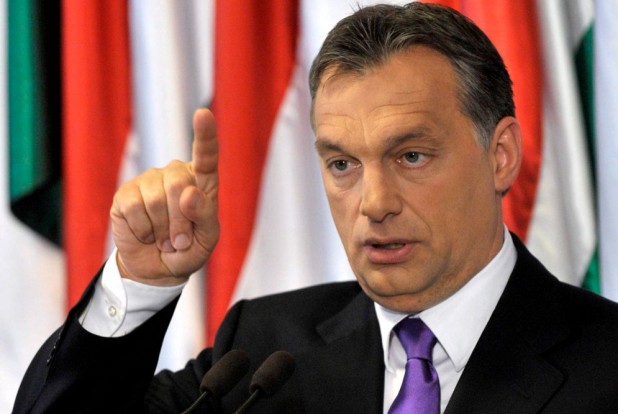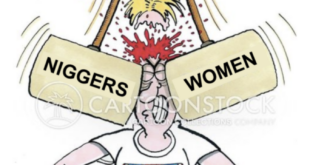Kevin MacDonald
Occidental Observer
September 28, 2015
We are all aware of how everyone high and low in the West cowers before charges of “racism,” “xenophobia,” etc. It’s beautiful to see Hungary’s PM Viktor Orban rejecting such talk out of hand and calling attention to the failure of multiculturalism. Whereas other European leaders, like Angela Merkel have already noted that multiculturalism has “utterly failed,” their response is to double down on multiculturalism by bringing in yet more unassimilable, low-IQ immigrants. Perhaps the Ossis will indeed save Europe.
Hungary to EU: migrant quotas will repeat Western Europe’s ‘failed’ attempts at multiculturalism
Hungary has defended its opposition to Brussels’ plans for compulsory migrant quotas, saying it did not wish to repeat the West’s “failed experiments” in multiculturalism.
In a defiant rejection of diktats from Europe’s high command, the country’s right-wing government said it was not interested in “lectures” from the European Union about taking in Middle Eastern refugees.
The comments were a direct challenge to remarks last week by one of the EU’s most senior figures, who criticised Hungary’s prime minister, Viktor Orban, for opposing the quotas plan and for fencing off its borders to migrants trying to reach Europe.
Frans Timmermans, the Dutch vice-president of the European Commission, said that “diversity was the future of the world,” and that Eastern European nations would just have to “get used to that.”
In an interview with The Sunday Telegraph, Mr Orban’s spokesman, Zoltán Kovács, responded by saying that integration in much of Western Europe had been at best a limited success. Hungary, he said, felt neither the wish nor the obligation to follow suit.
“Contrary to Mr Timmerman’s vision, we can’t see into the future,” Mr Kovács said. “But we are aware of the past, and multi-culturalism in Western Europe has not been a success in our view. We want to avoid making the same mistakes ourselves.”
…
On Wednesday, a plan drawn up Jean-Claude Juncker, the president of the European Commission, for EU states to redistribute 120,000 asylum seekers across the 28-member bloc was pushed through by a qualified majority vote, in the teeth of opposition from Hungary, Poland, the Czech Republic and Slovakia. Both Hungary and Slovakia have threatened legal challenges to the ruling.
While critics accuse Mr Orban of racism over his comments that “Christian Europe” is now under threat, Budapest insists that ex-Communist states have neither the money nor the cultural history to host large numbers of non-European migrants. The prescriptions from Brussels bureaucrats on what constitutes the make-up of an ideal society has also revived memories of Soviet rule from Moscow.
“Mr Timmermans is right that we have not had the same experience as Western Europe, where countries like Holland, Britain and France have had mass immigration as a result of their colonial legacies,” added Mr Kovács. “But we would like to deal with our problems in a way that suits us.
“And we especially don’t like it when people who have never lived in Hungary try to give us lectures on how we should cope with our own problems. Calling us racists or xenophobes is the cheapest argument. It’s used just to dodge the issues.”
The wrath directed at Hungary was prompted by its decision to fence off its borders, and to then use tear gas and water cannon when migrants continued to enter the country.
But while Mr Orban has been cast as a bogeyman for his blunt and often inflammatory language, his solution for dealing with the migrant crisis is little different from Britain’s, arguing that creating a quota system will only encourage more new arrivals.
Instead, both countries say the priorities should be improving conditions in refugee camps in Syria’s neighbouring states, Turkey, Jordan and Lebanon, and greater funding of the Frontex border control agency in so-called “frontline” states like Greece, from where thousands of migrants are now arriving every week across the Aegean Sea from Turkey. Mr Kovács also queried why the Greece’s 100,000 strong army – historically large because its past war with Turkey – could not do more.
His comments came as Hungary’s ambassador to London, Péter Szabadhegy, also spoke out to claim common cause with Britain on the issue. In a briefing to British journalists last week, he said the British public had been jamming the switchboard of Hungary’s embassy to London in support of Budapest’s controversial stance. Of the 300 phone calls, emails and letters that were reaching the embassy’s Belgravia HQ every day, 70 per cent described Hungary’s actions as “God’s gift to Europe.” The rest were mostly insults such as “heartless scum”. …
But as we know, massive non-White immigration and multiculturalism have always been top-down impositions by elites, not firmly rooted in popular demand. Western societies are media-dominant oligarchies run by an unholy alliance between anti-White ethnic activists and business interests that profit from immigration.
Mr Orban, who has accused Germany of “moral imperialism” over its insistence that Hungary should take its share of migrants, does not appear to have paid a domestic political price for his stance. A poll conducted earlier this month showed that some 82 of Hungarians favoured tighter immigration controls, reflecting how for many Hungarians, being a “monocultural society” is seen as a source of pride rather than concern.
“Homogeneity is seen as a value, and this is difficult to understand in the West,” said Konstanty Gebert, an expert with the European Council on Foreign Relations think-tank.
Mr Orban has been accused of playing to the demands of Hungary’s Far Right Jobbik movement, one of the strongest and most radical Far Right movements in Europe, which is currently Hungary’s second most popular party.
Mr Kovács claimed that Mr Orban’s Fidesz party had enough of a parliamentary majority not to have to cede to pressure from Jobbik. But he warned of a growing disconnect between ordinary European voters and most of Europe’s political masters on the migrant issue.
“If you take a look at the most polls across Europe, it is very visible that most Europeans see migration as the most important issue, and their view is now at odd with those of the leaders of Europe,” he said.
Meanwhile, Merkel continues to pursue the Utopian dream:
He spoke as the German chancellor, Angela Merkel urged Germans to bring back the spirit of the country’s reunification in 1990 to face the challenge of accommodating an anticipated 800,000 migrants this year.
“German unity was naturally very special,” Ms Merkel said, speaking ahead of the 25th anniversary of reunification on October 3. “That general feeling – when we are faced with a major task that we can achieve – that, I believe, we can absolutely remember how to do.”
Let’s see. Integrating people who share the same ethnicity, the same language, and the same cultural background is really no different than integrating Middle Easterners and Africans with zero similarities to Europeans. The woman is positively insane.
The legal challenge that Hungary and Slovakia are now contemplating to the quota edict will end up before the European Court of Justice in Luxembourg, which adjudicates on decisions made by EU bodies.
Professor Michelle Everson, an expert in European law at London University’s Birkbeck College, doubted it would succeed, as the court would probably rule the quota edict be a legitimate response to a “state of emergency”.
“Given that Angela Merkel has already said that the migrant crisis is a greater crisis than the sovereign debt crisis, I really wouldn’t give much for the chances of Hungary in challenging the decision,” she said.
At which point, let’s hope that Hungary, Slovakia, Poland and the Czech Republic do the only reasonable thing and leave the EU.
 Daily Stormer The Most Censored Publication in History
Daily Stormer The Most Censored Publication in History



